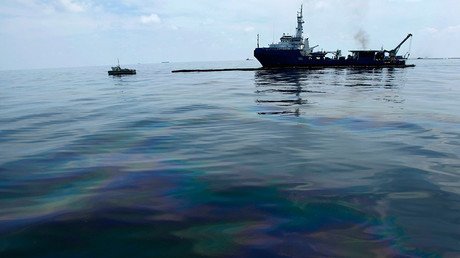Kuwait battles oil spill in Persian Gulf close to popular summer beaches (VIDEO)
The Kuwaiti authorities are working to contain an oil spill that has tarred the beaches and left long black slicks in the area of Ras al-Zour, but activists have accused it of covering up the full scale of the damage.
On Saturday, the government announced that boats and crews were dispatched to drop containment booms in the area, a kind of floating barrier to stop the oil spill moving further. According to the state-run Kuwait News Agency, the authorities’ priorities were first to secure waterways, power plants and water facilities.
“Emergency teams from the Kuwait Oil Company (KOC), Kuwait National Petroleum Company (KNPC), several other oil companies, the Ministry of Electricity and Water and Environment Public Authority, have harnessed all efforts and capabilities to deal with the oil spill in south Kuwait,” said Kuwaiti oil sector spokesman Sheikh Talal Al-Khaled Al-Sabah, in a statement carried by the official KUNA news agency. “They are now focusing their efforts on protecting water outlets near the country's northern and southern Al-Zour power and water stations.”
“Nearby beaches will be cleaned once power and water plants are secured and the oil spill is put under full control,” he added.
Since then, oil minister Essam al-Marzouq told the al-Rai newspaper on Sunday that no more patches of oil have been found and the authorities were working on clearing up those that were closest to shore. According to al-Marzouq, the clean-up operation should be over by the end of the week.
It’s not yet clear where the oil spill originated, but some experts quoted by Kuwaiti media place the blame at the feet of an old 50-km pipeline from the joint Saudi-Kuwaiti Al-Khafji offshore oil field, where they estimate as many as 35,000 barrels of crude oil may have leaked into the waters surrounding Ras al-Zour. However, al-Khafji Joint Operations has said its facilities are safe and unaffected by the spill, instead attributing the accident to a tanker. Sheikh Abdullah al-Sabah, a member of the ruling family who is head of the Environment Public Authority, told AP there will be “severe consequences to those responsible for this incident.”
But Khaled al-Hajeri, the president of Kuwait's Green Line Society, has accused the government of covering up the full scale of the spill, saying the authorities already knew about the leak on Thursday.
"The government failed to issue a statement communicating the severity of this disaster. There was no warning people against fishing or entering the polluted area, even though it is close to some of the most popular summer destinations in Kuwait," al-Hajeri told AP.
"This media blackout is intentional, and wrong. People have the right to know. This will have an impact on the fish, the food people consume, and it directly affects their health and safety."
Assisting in the clean-up operation is the American oil giant Chevron Corp., which operates oil fields on both the Saudi and Kuwaiti sides of the border, as well as Oil Spill Response Limited (OSRL).
Ras al-Zour is the site of a new refinery that is being constructed by the Kuwait National Petroleum Company (KNPC), due to be the largest in the Middle East with a capacity of 615,000 barrels per day and $11.5 billion worth of contracts.
Kuwait is home to the six-largest estimated oil reserves in the world, which make up around 95 percent of its export revenue. During the 1991 Gulf War, Iraqi leader Saddam Hussein ordered the oil fields to be set alight as his army retreated from the forces of the US-led coalition in Operation Desert Storm.














